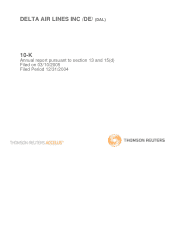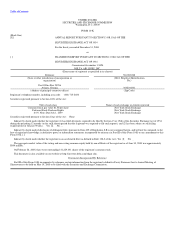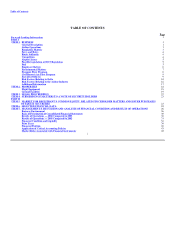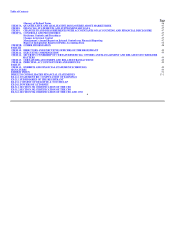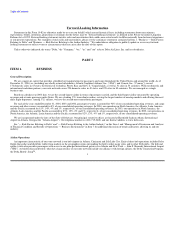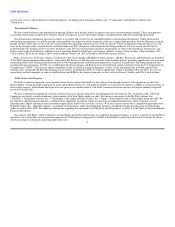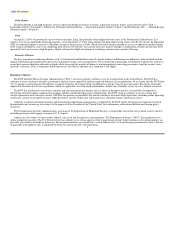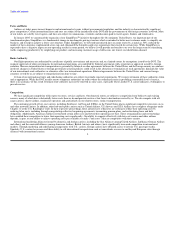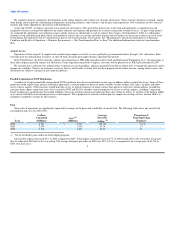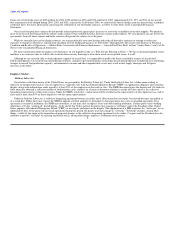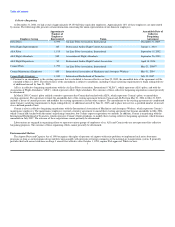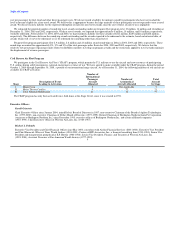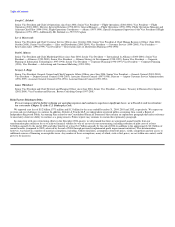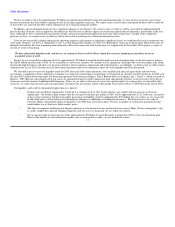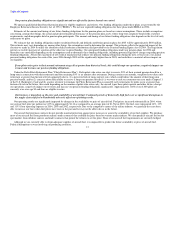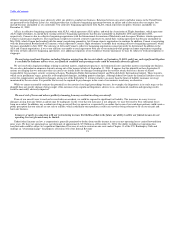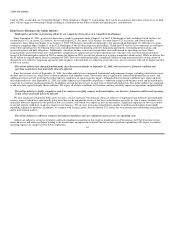Delta Airlines 2004 Annual Report Download - page 10
Download and view the complete annual report
Please find page 10 of the 2004 Delta Airlines annual report below. You can navigate through the pages in the report by either clicking on the pages listed below, or by using the keyword search tool below to find specific information within the annual report.
Table of Contents
shown net of fuel hedge gains of $105 million for 2004, $152 million for 2003 and $136 million for 2002. Approximately 8%, 65% and 56% of our aircraft
fuel requirements were hedged during 2004, 2003 and 2002, respectively. In February 2004, we settled all of our fuel hedge contracts prior to their scheduled
settlement dates. For more information concerning the settlement of our fuel hedge contracts, see Note 4 of the Notes to the Consolidated Financial
Statements.
Our aircraft fuel purchase contracts do not provide material protection against price increases or assure the availability of our fuel supplies. We purchase
most of our aircraft fuel from petroleum refiners under contracts that establish the price based on various market indices. We also purchase aircraft fuel on the
spot market, from off-shore sources and under contracts that permit the refiners to set the price.
While we currently have no fuel hedge contracts, we may periodically enter into heating and crude oil derivative contracts to attempt to reduce our
exposure to changes in fuel prices. Information regarding our fuel hedging program is set forth under "Management's Discussion and Analysis of Financial
Condition and Results of Operations — Market Risks Associated with Financial Instruments — Aircraft Fuel Price Risk" in Item 7 and in Notes 3 and 4 of the
Notes to the Consolidated Financial Statements.
For more information about the impact of jet fuel prices on our liquidity needs, see "Risk Factors Relating to Delta — We have substantial liquidity needs,
and there is no assurance that we will be able to obtain the necessary financing to meet those needs on acceptable terms, if at all."
Although we are currently able to obtain adequate supplies of aircraft fuel, it is impossible to predict the future availability or price of aircraft fuel.
Political disruptions or wars involving oil-producing countries, changes in government policy concerning aircraft fuel production, transportation or marketing,
changes in aircraft fuel production capacity, environmental concerns and other unpredictable events may result in fuel supply shortages and fuel price
increases in the future.
Employee Matters
Railway Labor Act
Our relations with labor unions in the United States are governed by the Railway Labor Act. Under the Railway Labor Act, a labor union seeking to
represent an unrepresented craft or class of employees is required to file with the National Mediation Board ("NMB") an application alleging a representation
dispute, along with authorization cards signed by at least 35% of the employees in that craft or class. The NMB then investigates the dispute and, if it finds the
labor union has obtained a sufficient number of authorization cards, conducts an election to determine whether to certify the labor union as the collective
bargaining representative of that craft or class. Under the NMB's usual rules, a labor union will be certified as the representative of the employees in a craft or
class only if more than 50% of those employees vote for union representation.
Under the Railway Labor Act, a collective bargaining agreement between an airline and a labor union does not expire, but instead becomes amendable as
of a stated date. Either party may request the NMB to appoint a federal mediator to participate in the negotiations for a new or amended agreement. If no
agreement is reached in mediation, the NMB may determine, at any time, that an impasse exists and offer binding arbitration. If either party rejects binding
arbitration, a 30-day "cooling off" period begins. At the end of this 30-day period, the parties may engage in "self help," unless the President of the United
States appoints a Presidential Emergency Board ("PEB") to investigate and report on the dispute. The appointment of a PEB maintains the "status quo" for an
additional 60 days. If the parties do not reach agreement during this period, the parties may then engage in "self help." "Self help" includes, among other
things, a strike by the union or the imposition of proposed changes to the collective bargaining agreement by the airline. Congress and the President have the
authority to prevent "self help" by enacting legislation which, among other things, imposes a settlement on the parties.
6

